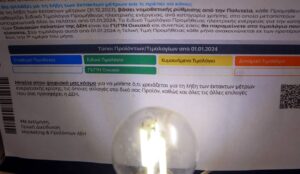The sixth disbursement request for resources from the Recovery and Resilience Facility, amounting to €2.1 billion in grants, was submitted today to the European Commission by Deputy Minister of National Economy and Finance Nikos Papathanasis, following the completion of 39 new milestones and targets, according to an announcement from the Ministry of National Economy and Finance Press Office.
Sixth funding request for €2.1 billion from Recovery Fund after completing 39 additional targets
To date, Greece has successfully completed 5 payment requests and the total amount of disbursements from Recovery and Resilience Facility resources to the country amounts to €21.3 billion, exceeding 59% of the total budget of the National Plan “Greece 2.0”. With the completion of the 6th request submitted today, total disbursements to Greece will now reach €23.4 billion, representing 65% of the total resources allocated to the country, while grant disbursements specifically will reach €12.04 billion, representing 66% of available resources. The request for the loan component, amounting to €1.8 billion, will be submitted within September.
The milestones fulfilled for the submission of the 6th request reflect implementation progress in projects and reforms across a series of crucial sectors for improving citizens’ daily lives, including public education, health, social care, reducing energy costs, and transportation safety. Indicative achievements include:
- Installation of over 36,200 interactive boards in secondary and high school classrooms of general and vocational education as well as in primary school sections.
- Completion and operation of the 1st phase of the Electronic Health Record.
- Improvement of the institutional framework for Personal Physicians.
- Launch of social benefit provision to nearly 1.3 million eligible citizens through prepaid cards.
- Contracts for installing smart LED lighting systems on road networks, as well as for all road safety improvement projects at 7,780 dangerous points on the provincial and local road network. These include over 150 projects funded by the Recovery and Resilience Facility for Regions and Municipalities across the country.
- Installation of 11,580 photovoltaic systems subsidized for private individuals and farmers through the “Rooftop Solar” and “Farm Solar” programs.
Contracts for building infrastructure of 9 research centers and funding of 30 proposals for tourist ports
Additionally, aimed at upgrading infrastructure, contracts were signed for the building infrastructure of 9 research centers and funding was approved for 30 proposals for tourist ports. The efficiency of the Justice system is strengthened with the launch of judicial police operations and training of over 7,000 judges and judicial staff in digital skills. The central goal of modernizing public administration is supported by 95% completion of cadastral mapping and completion of the new Cadastre structure, while improvements to tax administration are achieved through milestone completion, including the integration of 400,000 cash registers and POS systems and their connection to Mydata, as well as broader reforms for tax legislation codification and tax evasion prevention.
Additionally, a series of interventions were promoted to advance the country’s energy autonomy through the REPowerEU plan, including the institutional framework for installing storage units in existing or new renewable energy power stations, for self-consumption and licensing of renewable energy installations in apartment buildings, providing incentives for increased installation and use of smart meters, while projects for electrical energy storage installation of 175MW were approved.
Skertsos: Our country continues to implement many important reforms at intensive pace
Minister of State Akis Skertsos emphasized: “The timely submission of the 6th request for disbursement of €2.1 billion from the Recovery and Resilience Facility after fulfilling 39 new milestones and targets confirms that our country – beyond implementing many major projects – continues to fulfill at intensive pace many important reforms that change citizens’ lives for the better and constitute commitments of the ‘Greece 2.0’ plan. This was preceded by Commission and ECOFIN approval of the Revised ‘Greece 2.0’ Plan, which added investments and projects beneficial for the economy and society, such as comprehensive safety infrastructure upgrade of OSE’s ten largest railway tunnels using smart systems, creation of smart crossings at schools, and development of autonomous smart lighting networks on road axes under the supervision of the country’s 13 Regions, as well as procurement of an additional 175 electric buses in Athens and Thessaloniki. Digital services in public health are also strengthened and implementation of the Unified Digital Map is expanded with the addition of unauthorized construction recording systems via satellites and drones. To date, Greece has successfully completed 5 payment requests and the total disbursement amount of €21.3 billion exceeds 59% of the total budget of the National Plan ‘Greece 2.0′. With successful evaluation of the 6th installment, total disbursements to our country will reach €23.4 billion – 65% of the resources allocated to us and returning to society through substantial and vital projects. Our goal is to continue at the same pace and with the same faith in the many positive changes that the Recovery Fund brings to citizens’ lives, especially the most vulnerable population groups.”
Nikos Papathanasis: The 6th request represents continuation of the Government’s daily efforts
Deputy Minister of National Economy and Finance Nikos Papathanasis stated: “The 6th disbursement request from the Recovery and Resilience Facility, after completing 39 additional milestones and targets, represents the continuation of the Government’s daily efforts to ensure every available euro is directed toward benefiting society and the economy, and the country maintains its leading position among EU member states in European fund absorption. With planning and determination, we accelerate the reforms the country needs, implement our commitments to our fellow citizens, with the central goal of further increasing investments and jobs, dual convergence both in income levels with the rest of Europe and in balanced regional development throughout the country’s territory.”
Deputy Minister to the Prime Minister Thanasis Kontogeorgis noted: “With the submission of the 6th disbursement request of €2.1 billion in grants, within the framework of the National Recovery and Resilience Plan ‘Greece 2.0′, the achievement of significant milestones connected to reforms and investments aimed at strengthening the business environment, improving citizens’ daily lives in the critical sectors of education, health, transportation safety and social cohesion, as well as reducing the burden associated with energy costs, is confirmed. We continue intensive cooperation with determination and responsibility for successful program completion within agreed timelines for the benefit of all our fellow citizens.”
Recovery Fund Governor Orestis Kavalakis stated: “The 6th payment request for €2.1 billion in grants from the Recovery and Resilience Facility was submitted to the European Commission. The fulfillment of 39 milestones and targets demonstrates the consistency with which investments and reforms are implemented in sectors such as health, education, public administration, and energy autonomy. We continue with dedication to fully utilize available resources.”
General Secretary of Coordination Evi Dramaliotou emphasized: “The submission of the 6th payment request of €2.1 billion, covering nearly 70% of the reform commitments of the National Recovery and Resilience Plan ‘Greece 2.0’, demonstrates effective coordination of government bodies and our determination for substantial changes. The 6th payment request includes a wide range of reforms implemented through 22 reform milestones. Among the key interventions are the institutionalization of personal physicians, approval of the new spatial strategy for maritime space, legislation for public procurement professionalization, implementation of the energy self-consumption framework, and simplification of licensing procedures for renewable energy installations in apartment buildings. Our goal is to continue working systematically for successful program completion, ensuring that every reform multiplies investment value to maximize their impact on society.”




